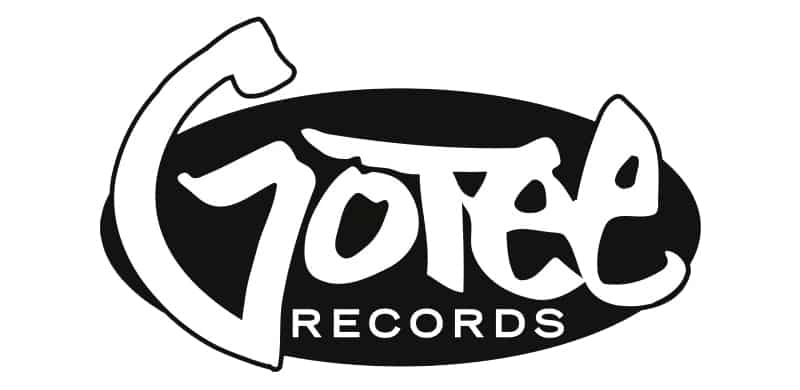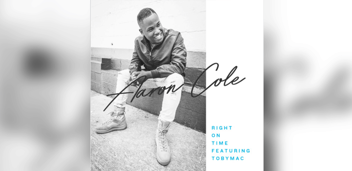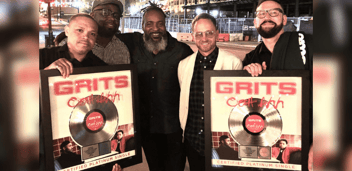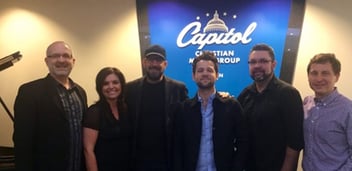
Twenty years is a high mark for any label, but for an independent like Gotee Records, it’s a monumental achievement. Yet Gotee is an atypical label with an artist roster built on genre pioneers and a penchant for pushing the envelope. Their risks have been oft rewarded, and co-founder Joey Elwood says caving in to industry fears is still his primary concern.
For Elwood, those fears are not founded in the future of an ever-changing industry, but rather in the “management” versus “development” mindset. The future of streaming music, he believes, is bright for everyone. Certainly it’s also a promising road ahead for Gotee with a host of new talent like Jamie Grace and Capital Kings on board. Perhaps another twenty years isn’t so far fetched.
Congratulations on 20 years at Gotee. Have you had a good chance to sit back and reflect and take that in?
It’s been a long slow process of taking it in. It’s more of a cumulative taking it in than hitting the finish line and saying, “I can’t believe we’re here”. That’s not a sexy answer, but over the last five years, we’ve just felt that we can’t believe we’re still doing this. It’s not that we didn’t think we were capable. It’s just that we never thought of 20 years when we started. We were just taking things one album at a time. So at the risk of sounding self-deprecating, which I don’t mean to, I just never ever imagined having a conversation like this with somebody.
What did you expect? What were the earliest expectations that you can remember?
It’s like playing a game of basketball and hoping that you score a couple buckets. Then you get a couple and then you want a couple more. It was never about setting out to score 20 points. It was just about getting through the possessions. It was just wondering, “What if we could hit 100,000 on this record?” or even “What if we could get a second record with this artist?” It was really that simple.
I know that doesn’t sound very ambitious, but it was that honest. None of us really grew up in the record business. I never had a job at a record company before this one, so I didn’t go, “I see the result we’re after.” The result was a bit more macro –how do we get music in the hands of kids as an alternative to what they’re listening to. It was more of that than a big result, I think.
When you look back, is there a particular project or event that provided the biggest learning curve?
There was a project called Sonicflood. The band pretty much imploded pretty hardcore. I think, on a leadership level, I was not prepared in that moment to do anything but just make sure the shrapnel didn’t hit too many people. Rather than get in the middle of it and try and maybe, if there’s anything a person to do in leadership to prevent the carnage, I wasn’t prepared in that moment to get in there on a maturity level to help steer it and lead it.
It was a big huge wake-up call for me. It’s more than just watching things happen. It’s being in the middle of it, getting your hands dirty. It’s sticking your neck out there on a relational level, not just watching things hit the wall. It’s trying your best to help them get through the turn.
As a result of that, how did you change your approach or relationship with other artists?
I think I started looking for warning signals earlier. When the shots came across my bow, I would not just go, “Well, hopefully that will correct itself.” I would get more aggressive and intentional and say, “Okay, you just said that for a reason. Let’s sit down and talk. Let’s figure out if there’s a problem here.” I wasn’t that confrontational until that point. It was a lesson in leadership for me that I needed even beyond the record business. I needed that lesson as a husband and a father.
What’s the biggest hurdle for you right now?
The biggest hurdle right now is trying to remain fearless in a market that’s full of fear.
What does that mean?
It means everyone is coming out of the business where it was just Armageddon, and nobody is willing to take chances as much. People tend to still be managing things rather than developing things. It’s very easy to get into that mindset where you’re just, “Oh no, no. That’s a little deeper than we should go. We don’t even know if we’re going to be selling songs anymore.” They just start pulling back. Some of that is wisdom, but some of that is just fear. You have to be able to tell between the two. It’s about staying brave in a brave new world.
What does it mean tangibly for Gotee to follow that? That’s a common refrain in the industry right now considering how quickly things change. What does it mean to not fall prey to those fears and take those chances?
This is going to sound too touchy feely, but you’re going to know. Whether it’s in sports or whether it’s in life or whether it’s in business, you know when you are throttling back. You know it. You intuitively know it when you’re backing off. I think there’s wisdom, again, in some of that. You don’t want to be careless, but you also want to be fearless. That’s a harder line than to know the difference than the other.
I think if you’re in this business on a development level, I don’t know if you have any choice than to be a bit fearless. If you’re in it to manage a business or manage a financial spreadsheet, then you’re going to be careful and you’ll be buying people who are fearless to make it look like you’re fearless. It’s only because you’re looking at it from two different lenses.
Maybe it’s a volume thing. When you have a lot of volume you’re dealing with, maybe that’s responsible to manage a company only and not developing things. I don’t know that answer. I’ve never been put in a position where I’ve had to manage a 30 million company. But I do know that volume changes everything. Volume changes your decisions. It changes everything.
But I’ve learned to balance it a bit. I’ve learned to realize that it’s good to be a developer, but you have to always be responsible to some degree. You have to look at the numbers. But it’s the filter by which you view everything, if you view from the eyes of the developer or if you view through the eyes of the manager.
I won’t say one’s wrong, but I know it’s more comfortable for us to look through the eyes of the developer. I think there’s no way you can really go that way without being a little fearless. And it will get you in trouble at times, because you’re never going to bat a thousand when you’re doing that. Then again you won’t bat a thousand when you’re playing it safe.
Downloads are down. Streaming is here. How are you guys handling the shift?
I love it. I think it’s going to open everything up. I’m embracing it and I can’t wait for us to hit that new body of water and not just be in between the channels. I think the consumer’s going to like it. I think the artists will like it. I think everybody will like it. It’s going to depend a little bit on how some of the applications come with it. Is there going to be good applications for new artists inside of that world. I’m hearing tales already of some significant things being developed that will be unbelievable for new artists as it pertains to streaming and how they can be discovered.




